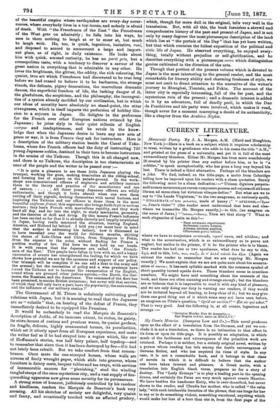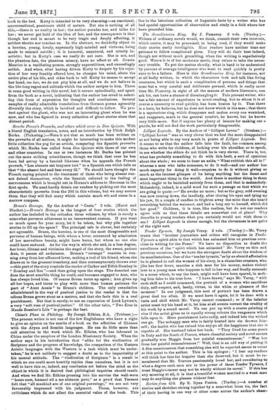My Cousin Maurice. (Sampson Low and Co.)—This novel produces. upon
us the effect of a translation from the German, and yet we con- clude it is not a translation, as there is no intimation to that effect in its form or upon its title-page. It is possibly an adaptation, in which much of the feebleness and extravagance of the primitive work are retained. Perhaps it is neither, but a strictly original novel, written by a person whose reading has lain among the feeble extravagance of German fiction, and who has acquired its vices of style. In any case, it is not a remarkable book, and it belongs to that clasa of novels in which it is difficult to believe that the author can have taken interest and pleasure. A Greek motto, with a translation into English blank verse, prepares us for a story of destiny. The "Lady Erinnys " is to play a leading part in the opening drama, and certainly the Fates are very much against cousin Maurice. We have besides the handsome Katty, who is over-described, but never shown to the reader, and Claudia her mother, who is called "the calm lady," with each intolerable iteration of the phrase, that one longs for her to say or to do something violent, something emotional, anything which would make her less of a bore than she is, from the first page of the
book to the last. Katty is intended to be very charming—an emotional, unconventional, passionate child of nature. But she is nothing of all this,—there is no reality in her; the author parades her, and talks for her ; we never get hold of the idea of her, and the consequence is that though her end is meant to be very tragic and deeply affecting, it neither shocks nor touches us. In the abstract, we decidedly object to a heroine, young, lovely, supremely high-minded and virtuous, being made to commit suicide ; it is immoral, unnatural, and utterly in- artistic; but in Katty's case we really do not care. She is not, and the phantom fate, the phantom misery, have no effect at all. Cousin Maurice is a vacillating person, strongly superstitious, and exceedingly selfish. And when, after having driven Katty to despair by his rejec- tion of her very frankly offered love, he changes his mind, alters the entire plan of his life, and rides back to tell Katty he means to accept her hand, too late, we do not pity him at all, and we do not believe in the life-long regret and solitude which the author assigns to him. There is some good writing in this novel, but it occurs episodically, and apart from the book as a novel, indicating that the author has erred in select- ing this form of expression for thoughts and conclusions. Several samples of really admirable translations from German poems agreeably diversify the story, which is involved and difficult to follow. We pro- test against the ghost, who was not an interesting ghost when he was new, and who has figured in every collection of ghost stories since that distant period.



































 Previous page
Previous page